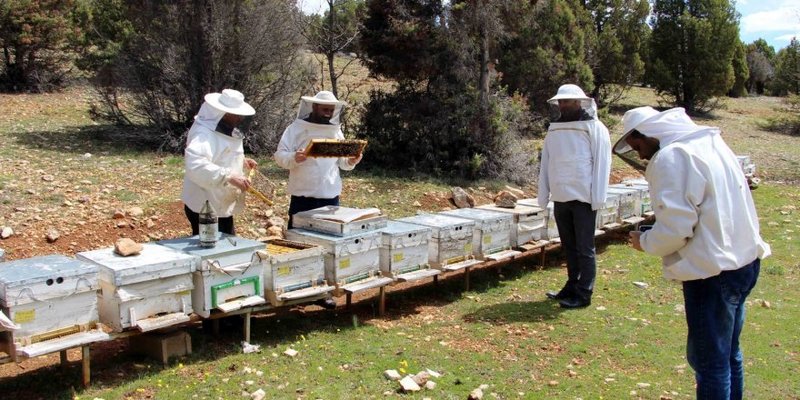
Mentioning the importance of soil and water for a sustainable planet, a Turkish official of a beekeeping organization stresses that bees are as crucial as soil and water in the sustainability of human life due to pollination.
On World Bee Day, Ziya Sahin, head of the Turkish Association of Beekeepers, spoke to Anadolu Agency on the importance of bees in the sustainable nature and situation of bees and beekeeping in Turkey.
"Agricultural lands are also as important as soil and water because 70% of all plants need pollination and in nature, it is the insects and bees that do it best, due to these facts, bees are crucial," he said.
Endangering the honey bee population also puts the human population in danger, Sahin highlighted by recalling Physicist Albert Einstein's words, "If the bee disappears from the surface of the Earth, man would have no more than four years left to live."
In the event of the extinction of bees, which play a serious role in pollination with insects, all plants and other living things in nature are seriously affected, he added.
Designated by the UN, World Bee Day is observed annually to raise awareness of the importance of pollinators, the threats they face and their contribution to sustainable development.
"The goal is to strengthen measures aimed at protecting bees and other pollinators, which would significantly contribute to solving problems related to the global food supply and eliminate hunger in developing countries," according to the UN.
The reason behind the day 'May 20' is related to the birthday of Anton Jansa, who pioneered modern beekeeping techniques in his native Slovenia and praised the bees for their ability to work so hard while needing so little attention during the 18th century.
Climate change's effects on bees
Stating that they constantly warn beekeepers about the effects of global climate change, Sahin underlined that bees are among the most affected by climatic fluctuations that will occur in nature as they are 100% dependent on nature.
"In 2020, the most impact of climate change in our country is in the Aegean and Mediterranean regions in Turkey and also there was 80% decrease in honeydew honey production in these regions, which is one of the clearest examples of climate change effects on bees and honey production," he noted.
In response to a question on any relationship between COVID-19 and honey production, he said that although there has been a decline in honey production since the beginning of the COVID-19 crisis, the drop is related to environmental reasons rather than virus effects.
He also stated that in order to develop beekeeping and increase honey production and quality, there should be a comprehensive agricultural policy.
Beekeeping in Turkey
Stating that Turkey is in the 3rd rank in honey production across the world as of 2020, however, Sahin noted that Turkey is in a serious decrease in honey production per hive.
"In the last ten years, the number of bees has been increased by the state, thanks to various supports and studies, but our production areas were not supported, honey production areas remained the same," he added.
Honey production areas should be increased urgently, for example, planting of gossypium, and sunflower, which we call cultivated plants, as well as production of root crops such as lavender, should be accelerated," Sahin stated.
He went on to say that Turkey is so rich in endemic plants that it is possible to increase honey production and the production of products such as royal jelly, pollen and propolis.
"We want the production areas to be expanded and honey produced to be registered like hives and we want to switch to the contracted production model -as it is practiced in many parts of the world-," he mentioned, stating that with these steps, registered and quality honey production will increase.
There are 8.2 million hives registered and 82,000 beekeepers in Turkey and the total production in 2020 was recorded as 114,000 tons, he noted.
"On this World Bee Day, we expect support to beekeepers to increase the bee production amount, quality and the amount of exported products," he stressed, adding that Turkey has the capacity to achieve this.